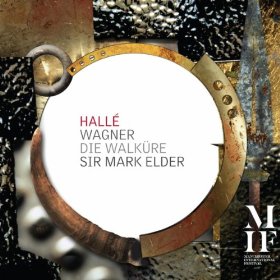I had read such great things about these performances on an opera chat board when they were current (the opera was recorded in two sections on two consecutive evenings in Manchester, England—July 15 and 16, 2011), that I looked forward to the release of the CDs. The performance isn’t for me.
As a rule, I prefer Böhm/Krauss-like performances to Levine/Furtwängler-like performances—i.e., quick and tense rather than slow and epic/narrative, but there are exceptions, such as the Karajan Walküre, which though slowish, is simply ravishing. Mark Elder, on this set, is very slow: just for the record, his acts take 71 minutes, 99 minutes, and 77 minutes, respectively. I won’t offer a thorough comparison and will not cheat by comparing his four-hours-and-seven-minutes to Boulez’s speed-freak 3 hours and 37 minutes, but I will note that the notoriously pokey Reginald Goodall, whose Walküre is strangely quick (for him), is only three minutes longer than Elder. Goodall somehow gets away with it; his tension is of a different, god-is-in-the-details type.
Elder allows things to slacken. The very fact that his prelude is a full third slower than Solti’s (4:16 vs 3:15) is a giveaway. You are more aware of the sheer sound of the very low strings than you are of the depiction of a treacherous storm; it chugs along like a train going up a hill. And his control over dynamics can throw things off—both the orchestra and voices during the opening exchange between the twins are so hushed as to be inaudible at any normally-set volume level. Hunding’s menace is undercut by the slow reaction time as well.
On the other hand, once the “Wintersturme” gets going, the flow is properly enchanting and the act ends in exultation, as it should. The slowness continues throughout, with the Brünnhilde/Wotan Act 2 give-and-take and Wotan’s Farewell so micro-managed that they lack the requisite tension: we’re too aware of the music to hear the drama. An odd critique, I realize, but there it is. The Todesverkündigung lacks the sheer opulence of voices required, and normally, when Brünnhilde is trying to lure Siegmund to Valhalla, the orchestra glistens with peace, majesty, and beauty. It goes for little here. However, the Valkyries’ chatter after the Ride and through Sieglinde’s outburst is both thrilling and chilling.
The singing is mostly quite good. Both Stig Andersen (Siegmund) and Yvonne Howard (Sieglinde) can almost stand up to the competition, which is fierce, and she reaches greatness in in Act 3. Clyve Bayley’s Hunding sounds nasty and unyielding, but as mentioned, a shorter temper would have been welcome. Susan Bickley’s Fricka is a formidable foe, but the voice itself is not on the level of, say, Christa Ludwig, and she does not rule the roost as she ought to in her brief but potent appearance.
Susan Bullock is the Brünnhilde. She begins quite poorly, with a nasty wobble on the sustained high Bs (here, Elder’s tempos are sensibly urgent, which should have helped), but she is a sensitive artist and her words always seem to come first. The fear in her voice as the final scene begins is palpable, and she is very moving throughout the scene, with the tessitura in a comfortable place. Egils Silins, a Latvian bass-baritone, has a wonderful way with both words and music. Most of his second act is sung quietly (saving his voice?) and he tells his long tale to Brünnhlide as a loving father would. Much later in the opera, after his anger abates, he reverts to quiet singing: this is a very sad Wotan, more at home with being a father than a god. It’s a fine performance and might have been better had the second-act narrative not threatened to come to a grinding halt.
The orchestra has some brass bobbles in the last act but is otherwise excellent. And Elder, like it or not—and I’ve made it clear that I don’t—has a point of view that he argues well. He has the long, story-telling arc down pat; one scene melts into the next with a natural flow. But let’s face it: there’s not a voice—or personality—here that can compare with Talvela or Frick as Hunding; Rysanek or Janowitz as Sieglinde; Varnay or Nilsson as Brünnhilde; Hotter or Tomlinson as Wotan; or Vickers as Siegmund. The opera is on 4 CDs, with a fifth containing libretto and notes.
































